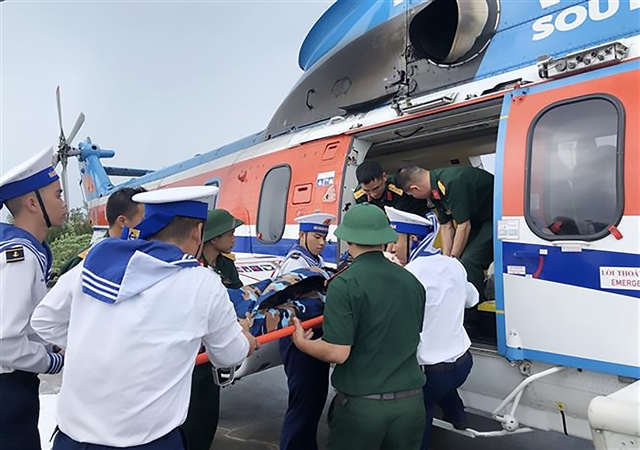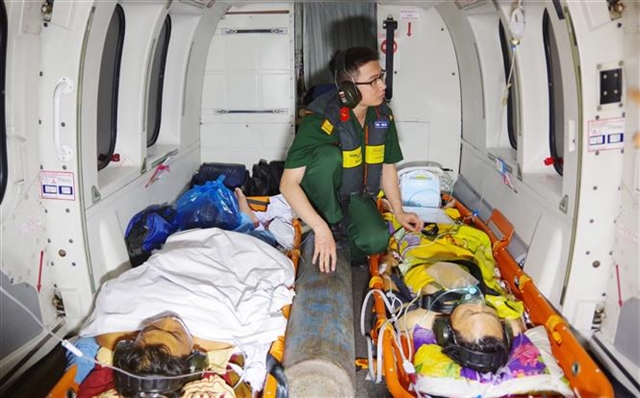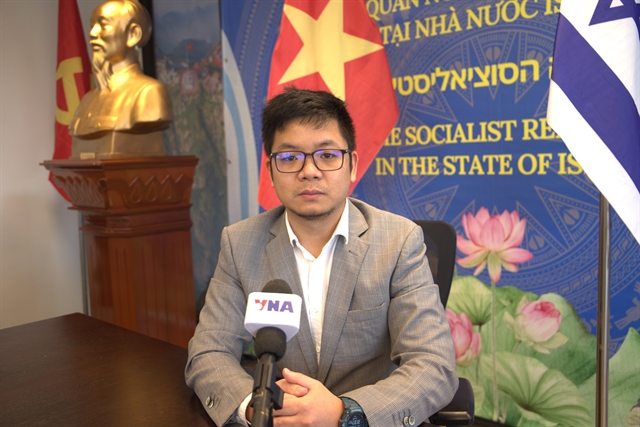 Society
Society

 |
| A patient is transported to the mainland in a medical emergency helicopter. — VNA/VNS Photo |
KHÁNH HÒA — Military medical soldiers of Military Hospital 175 are likened to "transporters" who are not afraid of danger, crossing the sea to carry lives back to the mainland for timely treatment.
Their flights across the sea have helped save the lives of many officers, soldiers and fishermen who are working in the Trường Sa (Spratly) archipelago waters off of Khánh Hòa Province.
At 19:30, captain and doctor Đinh Văn Hồng received an order to fly to Trường Sa to pick up two patients and return them to the mainland.
Thirty minutes later, the Airborne Emergency Team of Military Hospital 175 was present at Tân Sơn Nhất Airport, the EC225 helicopter of legion 18 was already waiting, and they were all on their way to Sinh Tồn Island in the archipelago.
Here, the emergency team picked up patient Nguyễn Kim Phi with poisoning and sepsis and patient Nguyễn Tràm with severe decompression due to scuba diving.
The two patients were transported immediately to the mainland overnight and in the early morning of the next day came to Military Hospital 175 in HCM City safely.
The crew was able to rest after handing over the patients. It meant the night emergency flight was completed.
This was just one of 20 emergency flights carried out by captain and doctor Đinh Văn Hồng, head of the Airborne Emergency Team of Military Hospital 175, over the past seven years.
Recalling the first time he boarded the emergency flight by helicopter, Hồng said: "The first time I was on an emergency flight, I was extremely worried and nervous because the nature of treating an emergency in a helicopter is completely different from that in a hospital.”
“Helicopters are narrow, noisy and wobbly, and it is difficult to perform emergency treatment. We always try to overcome the situation to keep patients safe," Hồng said.
Many times, Hồng and his team had to encounter difficult situations during the emergency flight bringing the patient to the mainland.
Those were times when the weather was bad with heavy rain and strong winds that forced them to fly low or there were times when the plane had problems in the air.
There were also times when the patient suddenly deteriorated that he and his teammates had to continuously perform emergency treatment during the many hours of flight.
In particular, he remembered a case when a patient got a traumatic brain injury due to falling but the patient could not get an x-ray to check the injuries due to the limited medical equipment on the island.
“After performing endotracheal intubation, our team transported the patient to the mainland but in the middle of the flight, the patient had cardiac arrest and pleural effusion,” Hồng recalled.
“In a small space and with the helicopter constantly wobbling due to bad weather, the three-person emergency team had to take turns continuously pressing the heart and draining the pleura,” he said.
Thanks to those efforts, the patient kept his vitals and was saved when he reached the mainland.
Despite completing the emergency flight in a state of exhaustion, Hồng and his colleagues were very happy because they helped the patient avoid death.
 |
| Captain, doctor Đinh Văn Hồng caring for patients on an emergency flight. — VNA/VNS Photo |
For senior lieutenant and doctor Tạ Văn Bạch, each flight is a challenge because most of the patients ordered to return to the mainland are in critical condition. Ensuring their safety during the flight is extremely difficult.
"An airborne medical emergency is always dangerous because we always have to face risks such as bad weather, plane crashes or even some destinations like rigs or small islands that make difficult to reach patients,” Bạch said.
“Honestly, every time we step on the helicopter to go to Trường Sa to transport patients to the mainland, we are always worried. Ensuring the safety of both the patients and the crew is always the most important thing," Bạch said.
The doctor still remembers a transport case one year ago.
“At 8pm, we received an order of emergency flight. When all were ready to board the helicopter, the whole crew received information that a tropical depression caused heavy rain over the sea. The flight had to be delayed,” he recalled.
"All night long, we were extremely worried about the health and lives of the patient. We could only silently pray that the patient could hold out for us to take him home," he said.
“At 7am the next day, when the weather was better, the crew immediately took off, although the circulation of the low pressure still caused heavy rain in the sea,” he said.
Heavy rain caused the helicopter to fly low, visibility was limited, and hazards could occur at any time.
The whole crew was still determined to complete the mission because they knew that on a remote island, the patient was waiting, and if they did not come, the patient's life would be difficult to guarantee.
Colonel and doctor Vũ Đình Ân, deputy director of the hospital’s Emergency Department, said that since 2012, there have been flights to transport patients from Trường Sa to the mainland for emergency treatment.
Up to now, the Airborne Emergency Team, consisting of eight doctors and four nurses, has carried out nearly 100 flights and 100 per cent of them have successfully performed first aid, Ân said.
This means that 100 precious lives of officers, soldiers and fishermen who are working on the islands and Vietnamese waters were saved.
Among the emergency flights, 65 per cent were fishermen working at sea, and only about 35 per cent were officers and soldiers serving in Trường Sa.
"Anyone, whether they are officers, soldiers or people in distress or have health problems, will be brought back to the mainland for timely treatment," said the doctor.
Joy after flights
Sitting up and walking again after 15 days on a hospital bed, Trịnh Tân Tiến, 31, living in Phan Rang Town of Ninh Thuận Province, said that at dawn on October 1, while fishing, he slipped and fell off the boat, hitting the side of the boat.
He was taken to the Medical Centre of Trường Sa Town where he got first aid and was diagnosed with closed abdominal trauma, a grade 4 liver rupture, heavy intra-abdominal bleeding and blood loss.
Due to his severe condition, Tiến was taken by helicopter to the mainland and was immediately operated by doctors of Military Hospital 175.
Fifteen days after surgery, Tiến has almost recovered.
“When I fell down I thought I would die because I was in the middle of the ocean, how could I save myself. Thanks to the doctors and nurses at Trường Sa Medical Centre and especially the soldiers who gave me blood, I was brought back to the mainland in time by the flight crew, and I was saved," Tiến said.
Also narrowly saved thanks to an emergency flight, Mai Xuân Bình, 50, from Quảng Bình Province, was transported to the mainland when he got severe belly pain and vomited while on Nam Yết Island.
The abdominal pain did not subside, and difficulty of breathing reappeared, making him gradually lethargic. When he woke up, he found himself at Military Hospital 175.
"The doctors said that I had a gastrointestinal infection, cardiovascular complications, multiple organ failure and was sent back to the mainland overnight. I was in a coma for 62 days in a hospital bed, the doctors did everything to save me," said Bình.
"Watching the smiles and tears of patients and their families, we are also happy. Perhaps this is joy, a worthy reward for what we have done," said doctor Bạch.
What the members of the Airborne Emergency Team are proud of is that their flights are always timely.
Every time they step on the medical emergency helicopter, it mean facing danger. But with just an order, the Airborne Emergency Team quickly sets off regardless of day or night, calm weather or rough seas.
"Because we are soldiers,” doctor Hồng said. — VNS




